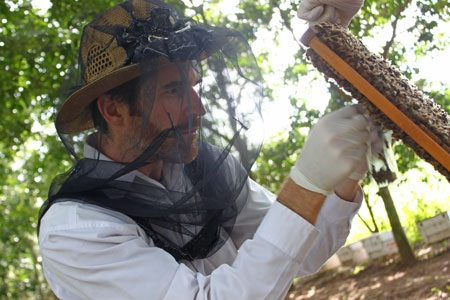Auburn Apiary Specialist Ready To Create Buzz In Bee Industry

With his arrival on Ag Hill in November, Geoffrey Williams became Auburn University College of Agriculture’s first full-time faculty member focused exclusively on honey bees and pollinator health.
“That is a little daunting when I think about it,” said Williams, an assistant professor of insect pollination and apiculture in the Entomology and Plant Pathology Department. “But it’s also incredibly exciting — paving the path for the future of a respected apiculture program at Auburn. My goal is to make a lasting impression on students about the major importance of pollinator health and honey bee populations.
Although some faculty dabbled in bee research and Extension’s Jim Tew served as apiculture outreach specialist since 1995, no Auburn scientist was dedicated to honey bee research before Williams.
Williams comes to the U.S. from Switzerland’s University of Bern. As a senior research associate there, Williams’ most recent findings suggest two widely used pesticides are unintended contraceptives in male honey bees.
That research could help explain the dramatic disappearance of honey bee colonies across the world over the past decade.
“We know that many environmental stressors, certainly parasites and poor nutrition, can affect honey bee health, but it’s possible that agricultural chemicals play an important role, too,” said Williams, a certified beekeeper.
While Williams will continue aspects of his research in Switzerland, he is prioritizing Alabama’s honey bee producers. The Alabama Farmers Federation’s Mac Higginbotham said the industry welcomes his assistance.
“Having a bee and honey researcher at Auburn is critical to the viability and longevity of the industry in Alabama,” said Higginbotham, the Federation’s Bee & Honey Division director. “We’re excited about the opportunity to discover new technologies and find answers that will improve the health of our bees and benefit the pollination efforts the apiary industry here needs at this time.”
Alabama beekeepers look forward to supporting Williams’ research programs, added Higginbotham, especially those focused on colony loss, increasing honey production and protecting bees from deadly parasitic mites.
Before completing his Ph.D. in 2013 at Dalhousie University in Halifax, Nova Scotia, Williams studied an exotic parasite affecting Canadian honey bees, investigated honey bee pesticide risks and monitored honey bee diseases in Canada, Minnesota and Arizona.
For more information, follow the Auburn University Insect Pollination and Apiculture Laboratory on Facebook, or contact Williams at williams@auburn.edu or (334) 844-5068.
